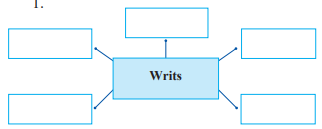Role of the Judiciary
Exercise
1. (A) Choose the correct alternative and complete the following statements.
1. United States is the first country to create Independent Judiciary. (India, United States, United Kingdom, Soviet Union)
2. The primary function of the judiciary is adjudication. (making laws, executing laws, adjudication, make appointments)
(B) Identify the incorrect pair in every set, correct it, and rewrite.
(a) Written Constitution – India
(b) Judicial Review – United Kingdom
(c) Independent Judiciary – United States
Answer:
The incorrect pair is (b) Judicial Review – United Kingdom.
Corrected pair: Judicial Review – United States
Rewritten set:
(a) Written Constitution – India
(b) Judicial Review – United States
(c) Independent Judiciary – United States
(C) State the appropriate concept for the given statement.
1. Petition regarding important public concern –
Answer: Public Interest Litigation (PIL)
2. The process of removal of judges –
Answer: Impeachment
3. Cases can be heard for the first time only in certain courts –
Answer: Original Jurisdiction
2. Complete the concept map.
Answer:
- Habeas Corpus
- Mandamus
- Prohibition
- Quo Warranto
- Certiorari
3. State whether the following statements are true or false with reasons.
1. There is no need to approve appointment of judges by the Senate in the United States.
Answer: False
Reason: In the United States, judges of the Supreme Court and subordinate courts are appointed by the President, but their appointments must be confirmed by the Senate.
2. In India judiciary is independent.
Answer: True
Reason: The Constitution of India provides for judicial independence by ensuring that judges cannot be removed easily and their appointments involve consultation with the Chief Justice of India, minimizing government interference.
4. Explain the co-relation between the following.
1. Judiciary and Executive
Answer: The judiciary and executive are two separate branches of government with distinct roles. The judiciary ensures that the executive’s actions comply with the law and the Constitution through adjudication and judicial review. For example, if the executive is a party in a dispute, the judiciary’s independence ensures fair judgment. However, the executive plays a role in appointing judges (in India, through the President), but this process is guided by constitutional provisions to maintain judicial independence.
2. Supreme Court and High Court
Answer: The Supreme Court and High Courts form a hierarchical judicial structure in India. The Supreme Court is the highest court, with original, appellate, and advisory jurisdictions, and it supervises all courts, including High Courts. High Courts operate at the state level, handling appeals from District Courts and exercising original jurisdiction in certain cases. They are subordinate to the Supreme Court, which can hear appeals against High Court decisions.
5. Express your opinion of the following.
1. Judiciary must have a leading role in the appointment of judges.
Answer: In my opinion, the judiciary should have a leading role in appointing judges to ensure its independence. If the executive or legislature dominates the process, there is a risk of political influence, which could compromise fair judgments. In India, the Collegium system, led by the Chief Justice and senior judges, helps maintain this independence by recommending appointments, ensuring that judicial expertise and integrity guide the selection process.
2. Judicial activism is significant today.
Answer: I believe judicial activism is significant today because it allows the judiciary to address issues like corruption, environmental concerns, or executive inaction that affect the public. For example, Public Interest Litigations (PILs) enable courts to act on matters of public concern, ensuring justice when the executive fails to act. However, it should be balanced to avoid overstepping into the executive’s or legislature’s domains.
6. Answer the following in detail with reference to the given points.
Explain the process of judicial review?
(a) Meaning
(b) Need
(c) When and where it started
(d) Indian context
Answer:
(a) Meaning:
Judicial review is the power of the judiciary to examine whether laws passed by the legislature or actions of the executive are consistent with the Constitution. If a law or action is found to violate the Constitution, the judiciary can declare it unconstitutional and invalid, ensuring the Constitution remains the supreme law.
(b) Need:
Judicial review is necessary to maintain the supremacy of the Constitution and prevent the legislature or executive from making laws or taking actions that violate constitutional provisions. Since the executive and legislature are involved in law-making, they cannot impartially judge their own actions. An independent judiciary, free from bias, ensures that laws align with constitutional values, protecting citizens’ rights and democratic principles.
(c) When and where it started:
Judicial review originated in the United States in 1803 through the landmark case Marbury vs. Madison. In this case, the U.S. Supreme Court, led by Chief Justice John Marshall, declared a law passed by Congress unconstitutional because it conflicted with the U.S. Constitution. This was the first time a court explicitly exercised judicial review, establishing it as an implied power, though not explicitly mentioned in the U.S. Constitution.
(d) Indian context:
In India, judicial review is also an implied power, not explicitly stated in the Constitution. The Supreme Court and High Courts use it to ensure laws and executive actions comply with the Constitution. A significant case is the Kesavananda Bharati vs. State of Kerala (1973), where the Supreme Court ruled that Parliament can amend the Constitution but cannot alter its “basic structure.” This decision confirmed the judiciary’s authority to review even constitutional amendments, safeguarding fundamental rights and democratic principles.


Leave a Reply